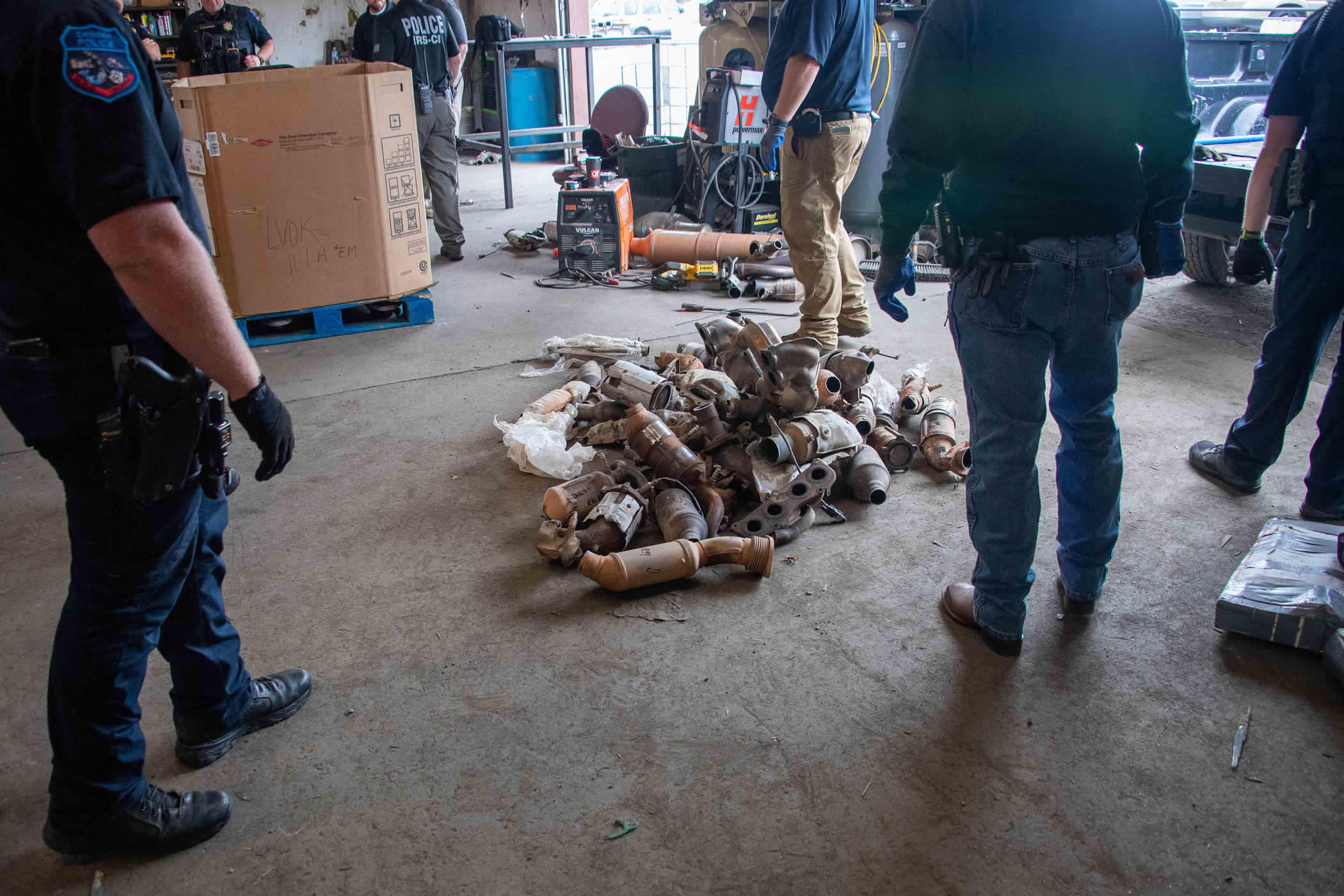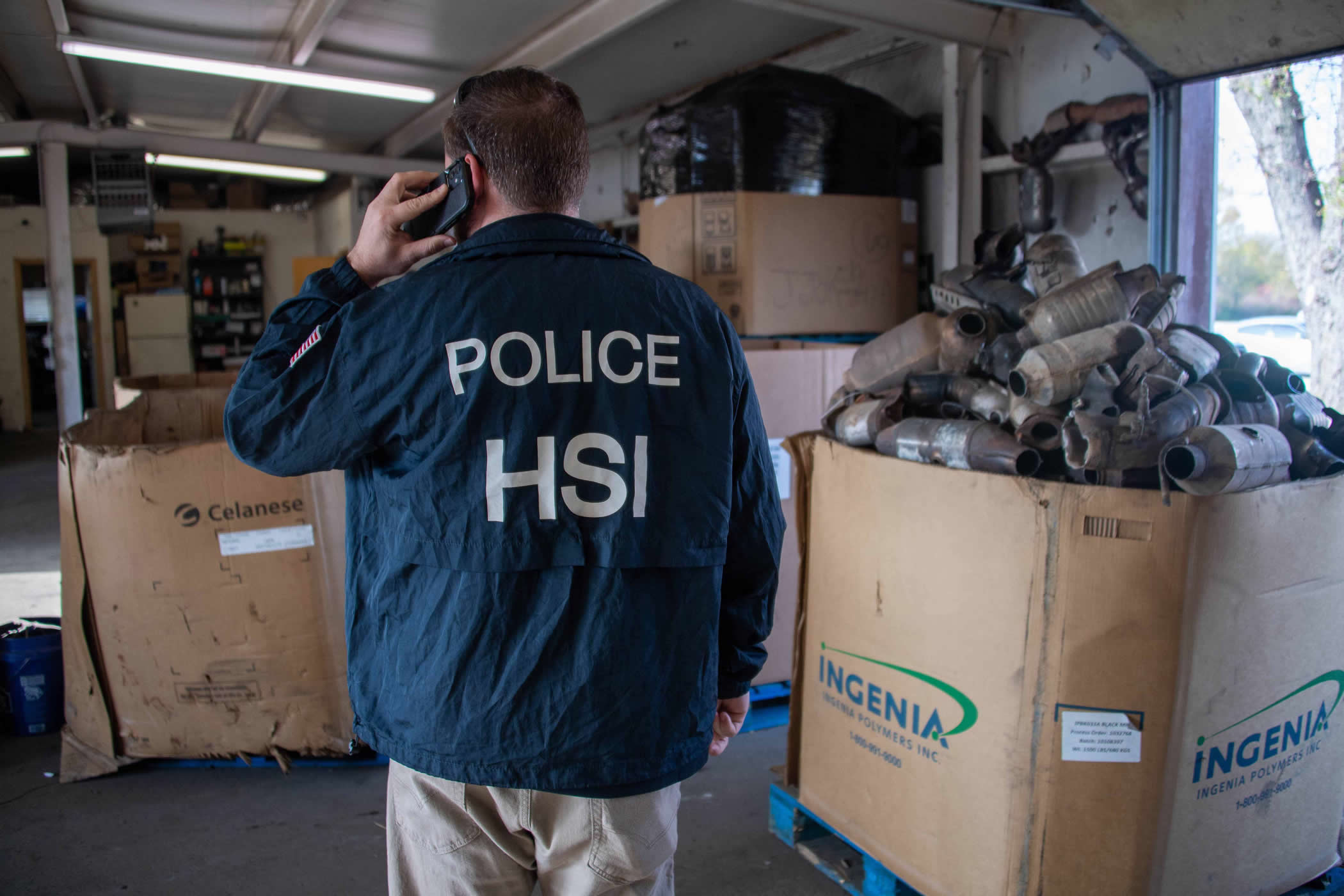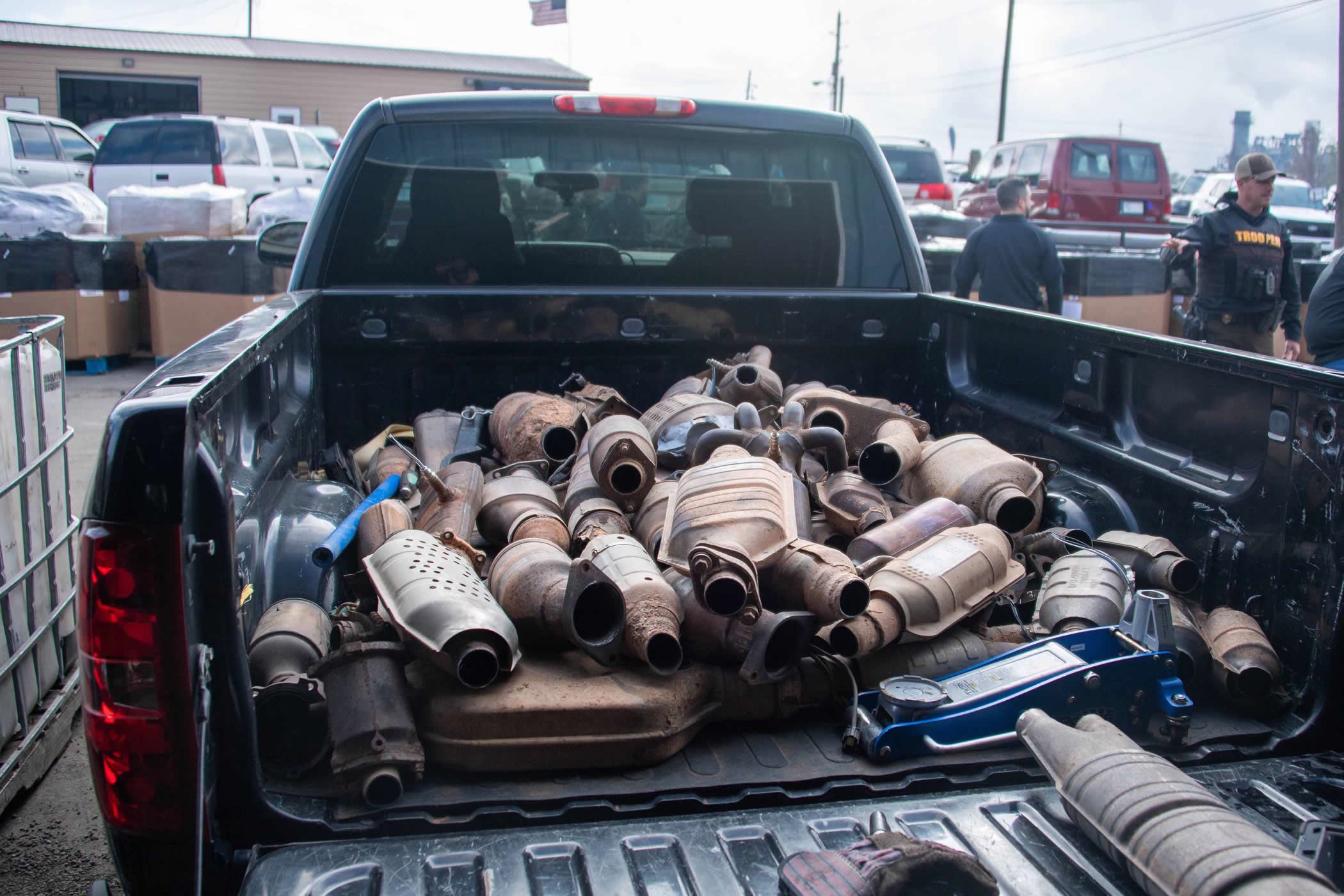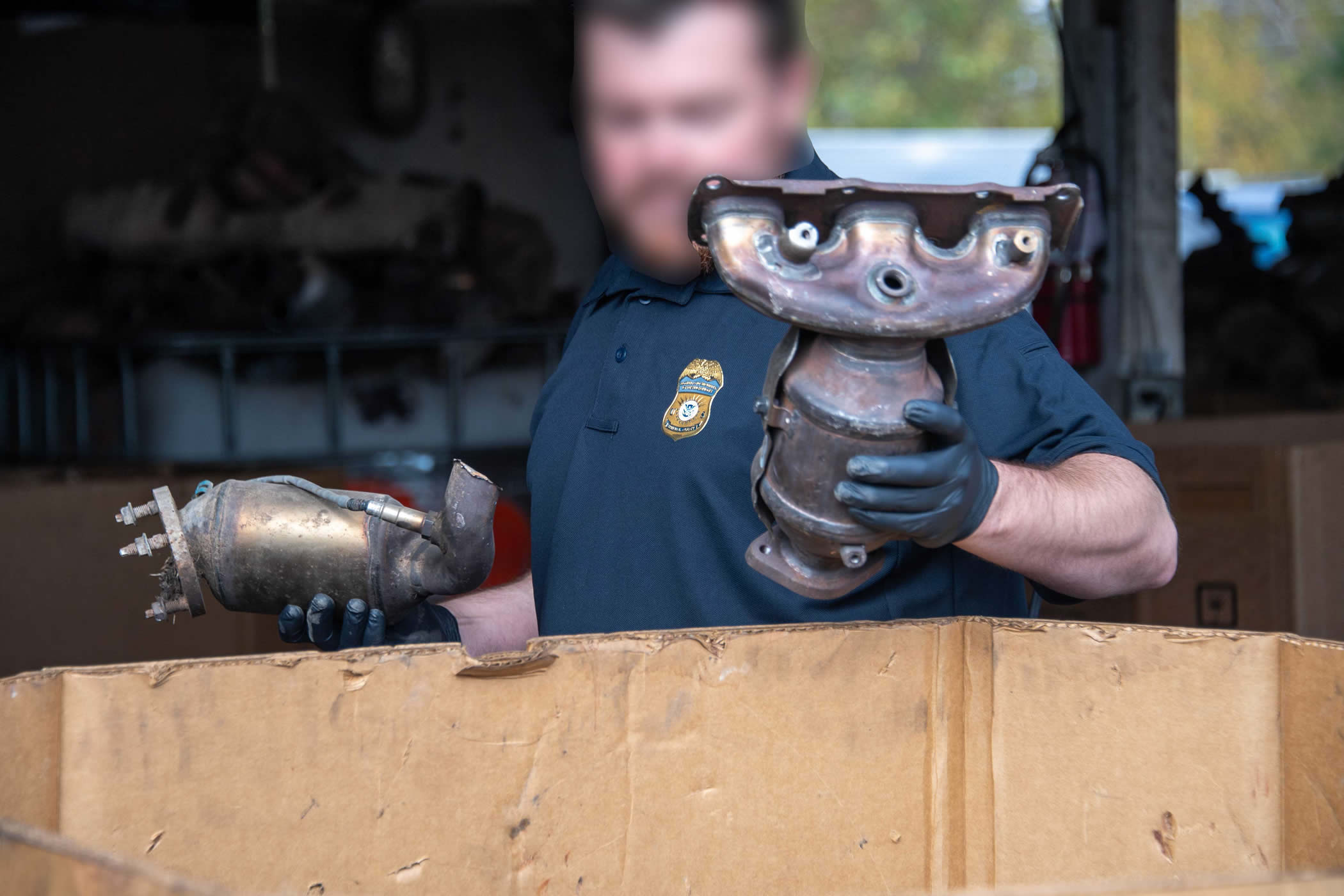Archived Content
In an effort to keep ICE.gov current, the archive contains content from a previous administration or is otherwise outdated. This information is archived and not reflective of current practice.
HSI integral in takedown of national multi-million-dollar catalytic converter theft ring
WASHINGTON — Federal, state, and local law enforcement partners from across the United States, including Homeland Security Investigations (HSI), executed a nationwide, coordinated takedown Nov. 2 of leaders and associates of a national network of thieves, dealers, and processors for their roles in conspiracies involving stolen catalytic converters sold to a metal refinery for tens of millions of dollars.
Arrests, searches, and seizures took place in California, Minnesota, New Jersey, New York, Nevada, North Carolina, Oklahoma, Virginia, and Wyoming. In total, 21 individuals in five states have been arrested and/or charged for their roles in the conspiracy.
The 21 defendants are charged in two separate indictments that were unsealed Nov. 2 in the Eastern District of California and the Northern District of Oklahoma, following extensive law enforcement arrest and search operations. In addition to the indictments, over 32 search warrants were executed, and law enforcement seized millions of dollars in assets, including homes, bank accounts, cash, and luxury vehicles.
“The success of this national takedown highlights the importance and necessity of dynamic law enforcement partnerships that we foster at DHS every single day," said Deputy Secretary of the Department of Homeland Security John K. Tien. “This calculated, cooperative whole-of-government approach across multiple states illustrates our commitment to protecting the homeland from those who seek to profit from sophisticated schemes. HSI will continue to focus its efforts on keeping these types of criminal elements off our streets while dismantling the groups behind these and other thefts.”
Catalytic converters are components of an automotive vehicle’s exhaust system that reduce toxic gases and pollutants from a vehicle's internal combustion engine into safe emissions. Catalytic converters use precious metals in their center, or “core”, and are regularly targeted for theft due to the high value of these metals, especially palladium, platinum, and rhodium. Some of these precious metals are more valuable per ounce than gold and their value has increased in recent years. The black-market price for catalytic converters can be more than $1,000 each, depending on the type of vehicle. Additionally, catalytic converters often lack unique serial numbers, VIN information, or other distinctive identification features, making them difficult to trace to lawful owners. Thus, the theft of catalytic converters has become increasingly popular because of their value, relative ease to steal, and lack of identifying markings.
The process to remove the precious metals from the catalytic converters is complex and may release toxic gases. Therefore, catalytic converters are typically sold intact to an extraction company. The extraction company will remove the core from the catalytic converter using a “de-canning” process that crushes the honeycomb structure (or brick) inside the core, resulting in precious metal powders. The process of de-canning crushes the brick inside the catalytic converters; new bricks are not available for sale to the public. The precious metal powders are then sold to a metal refinery for further processing.
Eastern District of California Case
A federal grand jury in the Eastern District of California returned a 40-count indictment charging nine defendants with conspiracy to transport stolen catalytic converters, conspiracy to commit money laundering, and other related charges.
According to court documents, brothers Tou Sue Vang, 31, and Andrew Vang, 27, and Monica Moua, 51, all of Sacramento, allegedly operated an unlicensed business from their personal residence in Sacramento where they bought stolen catalytic converters from local thieves and shipped them to DG Auto Parts LLC in New Jersey for processing. The Vang family allegedly sold approximately $38 million in stolen catalytic converters to DG Auto.
Defendants Navin Khanna, aka Lovin Khanna, 39; Tinu Khanna, aka Gagan Khanna, 35; Daniel Dolan, 44; Chi Mo, aka David Mo, 37; Wright Louis Mosley, 50; and Ishu Lakra, 24, all of New Jersey, operated DG Auto in multiple locations in New Jersey. They knowingly purchased stolen catalytic converters and extracted the precious metal powders to sell to a metal refinery. DG Auto sold the precious metal powders it processed from California and elsewhere to a metal refinery for over $545 million.
Northern District of Oklahoma Case
A federal grand jury in the Northern District of Oklahoma returned a 40-count indictment charging 13 defendants with conspiracy to transport stolen catalytic converters, conspiracy to commit money laundering, and other related charges.
According to court documents, together the defendants bought stolen catalytic converters from thieves on the street, then re-sold and shipped them to DG Auto in New Jersey for processing. Over the course of the conspiracy, defendant Tyler James Curtis received over $13 million in wired funds from DG Auto for the shipment of catalytic converters and received over $500,000 from Capital Cores for catalytic converters. Defendant Adam G. Sharkey received over $45 million in wired funds from DG Auto. And defendant Martynas Macerauskas received over $6 million in payments from DG Auto for catalytic converters. In all these incidents, most of the catalytic converters sold to DG Auto were stolen, and DG Auto knew or should have known that when they paid for them.
The 13 defendants are Navin Khanna, 39, of Holmdel, New Jersey; Adam Sharkey, 26, of West Islip, New York; Robert Gary Sharkey, 57, of Babylon, New York; Tyler James Curtis, 26, of Wagoner, Oklahoma; Benjamin Robert Mansour, 24, of Bixby, Oklahoma; Reiss Nicole Biby, 24, of Wagoner, Oklahoma; Martynas Macerauskas, 28, of Leila Lake, Texas; Kristina McKay Macerauskas, 21, of Leila Lake, Texas; Parker Star Weavel, 25, of Tahlequah, Oklahoma; Shane Allen Minnick, 26, of Haskell, Oklahoma; Ryan David LaRue 29, of Broken Bow, Oklahoma; Brian Pate Thomas, 25, of Choteau, Oklahoma; and Michael Anthony Rhoden, 26, of Keifer, Oklahoma.
Trial Attorney Danbee C. Kim of the Criminal Division’s Organized Crime and Gang Section, Assistant U.S. Attorney Veronica M.A. Alegría for the Eastern District of California, and Assistant U.S. Attorneys Reagan Reininger and David Nasar for the Northern District of Oklahoma are prosecuting the cases.
HSI, the FBI, and the IRS-Criminal Investigation are investigating the cases.
FBI Las Vegas (NV), FBI Richmond (VA), FBI Charlotte (NC), FBI Newark (NJ), FBI Dallas (TX), HSI Dallas (TX), HSI Houston (TX), HSI Amarillo (TX), HSI St. Paul (MN), HSI Long Island (NY), HSI Newark (NJ), IRS-CI Chicago Field Office (IL), IRS-CI Oakland Field Office (CA), IRS-CI Dallas Field Office (TX), IRS-CI Newark Field Office (NJ), Tulsa Police Department (OK), Tulsa County Sheriff’s Office (OK), Oklahoma Highway Patrol (OK), Oklahoma Attorney General’s Office (OK), Wagoner County Sheriff’s Office (OK), Houston Police Department (TX), Amarillo Police Department (TX), Broken Arrow Police Department (OK), Sacramento County Sheriff’s Department (CA), Sacramento Police Department (CA), Davis Police Department (CA), Auburn Police Department (CA), Livermore Police Department (CA), San Bernardino County Sherriff’s Department (CA), Customs and Border Protection (NJ), Port Authority Police Department of New York and New Jersey (NY; NJ), Hudson County Sheriff’s Office (NJ), Monmouth County Prosecutor’s Office (NJ), Monmouth County Sheriff’s Office (NJ), Morris Township Police Department (NJ), Springfield Police Department (NJ), New Jersey State Police (NJ), Union County Prosecutor’s Office (NJ), Port Authority of NY & NJ (NY; NJ), Howell Police Department (NJ), Warren Township Police Department (NJ), Freehold Borough Police Department (NJ), Middletown Police Department (NJ), Marlboro Police Department (NJ), Manalapan Police Department (NJ), Ocean County Sheriff’s Office (NJ), Burlington Police Department (NJ), Willingboro Police Department (NJ), Waterfront Commission of NY Harbor (NY), Nassau County Police Department (NY), Suffolk County Police Department (NY), Las Vegas Metropolitan Police Department (NV), Greensville County Sheriff’s Office (VA), Emporia Police Department (VA), Brunswick County Sheriff’s Office (VA), Halifax County Sheriff’s Office (NC), Saint Paul Police Department (MN), Minnesota Commerce Fraud Bureau (MN), Blaine Police Department (MN), McLeod County Sheriff’s Office (MN), Anoka County Sheriff’s Office (MN), Carver County Sheriff’s Office (MN), Roseville Police Department (MN), Plymouth Police Department (MN), Bloomington Police Department (MN), Eagan Police Department (MN), Woodbury Police Department (MN), Brown County Sheriff’s Office (MN), Brooklyn Park Police Department (MN), Fridley Police Department (MN), Mendota Heights Police Department (MN), Chaska Police Department (MN), and Coon Rapids Police Department (MN) provided assistance.
An indictment is merely an allegation. All defendants are presumed innocent until proven guilty beyond a reasonable doubt in a court of law.
HSI is the principal investigative arm of DHS, responsible for investigating transnational crime and threats, specifically those criminal organizations that exploit the global infrastructure through which international trade, travel, and finance move. HSI’s workforce of over 10,400 employees consists of more than 6,800 special agents assigned to 225 cities throughout the United States, and 93 overseas locations in 56 countries. HSI’s international presence represents DHS’s largest investigative law enforcement presence abroad and one of the largest international footprints in U.S. law enforcement.
Learn more about HSI’s mission @HSI_HQ.






